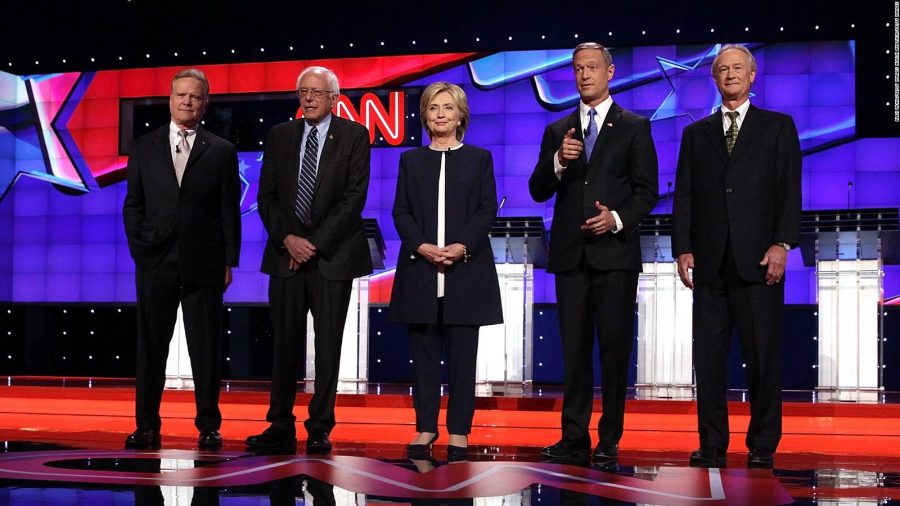Many have called the 2016 election “the year of the outsider.” It’s certainly looking that way, so far. Political nobody Donald Trump is the GOP frontrunner and Bernie Sanders, a socialist, trails Hillary Clinton by less than 20 points. When outsiders dominate the political news cycle, it sends a clear message: the Washington establishment is in trouble.
This outsider surge has caused the parties to polarize. The GOP debates saw many candidates embracing hard-line militaristic-nationalistic rhetoric fueled by populist sentiment. Trump’s 1,989 mile long border wall was met with acclaim; 70% of Republican voters support it. (Rasmussen) Disappointingly, the Democratic debate did not break precedent, parading the left side of populist policy.
The candidates–including ostensibly moderate front-runner Hillary Clinton–showed a new, far left face. And liberal populism took center stage.
Sanders was there in his usual far-left fury. He did not seek to moderate himself, and showed himself to be even more out there than most thought. When asked if he was a capitalist, Sanders responded, “No, (…) I believe in a society where all people do well.” In his attack on the rich, Sanders called Citizens United “disastrous.” Unembarrassed by his fringe ideology, he even embraced democratic socialism, calling for a $15 minimum wage, new taxes on the wealthy, free public college, and an end to trade deals which he believes benefit big corporations. Seemingly unfazed by the taboo idea of socialism, the democratic audience applauded his liberal positions.
The three low polling candidates did little to stand out. Only Webb deviated from the Democratic party’s new leftist tone, saying that “he doesn’t believe the revolution’s coming.” O’Malley and Chafee followed the general trend. The former Maryland governor urged for federal gun control and military restraint while touting his record on minimum wage hikes. Chaffee was much the same, focusing on “environmental stewardship” and ethics. Apart from Webb, the primary’s long shot candidates echoed the general left-populist sentiment.
Clinton was the biggest surprise. Although she firmly established herself to the right of Senator Sanders, she was the furthest left she’s ever been. Sure, when Sanders asserted America should be more Scandinavian, she replied “we are not Denmark (…) We are the United States of America.” And sure, she credited capitalism with building “the greatest middle class in history.” But her new face shone through.
To start, she reneged on her self-identification as a moderate, saying “I’m a progressive.” This new persona appeared in her drug positions, where she declared that she would not “interfere” with legal marijuana. About a year ago, she only supported medical use. She’s also scooped up a notorious populist position: attacking free trade. As secretary of state, Clinton was chief advocate for the Trans-Pacific Partnership trade deal. Yet on Tuesday night, she opposed it, saying that it “didn’t meet [her] standards.” The change is clear.
Just like the republicans, this political shift indicates a change in the democrats’ base. Younger, more liberal voters are fed up. Armed with youthful indignance, they protest income inequality and corporate power just as the right rages against immigration. This trend manifests itself at Richard Montgomery. In a recent poll by the tide, almost 70% believed Bernie Sanders won the debate. Clinton was the runner up, with about 19%, but it was not close. Clearly, opinion is shifting towards more liberal candidates.
The media has yet to catch up to this demographic change; most post-debate articles favored Clinton, despite polls showing the contrary. Time has Sanders winning with 57%, and Fox with over 80%. Of course, these straw polls do not use a reliable sample. But still, Richard Montgomery’s Bernie Sanders supporters were outraged. After the debate, social media was flooded with posts angrily protesting the news outlets’ disconnect from their opinions.
Most Richard Montgomery students would agree that Donald Trump’s brand of far right populism is bad, but they are divided on the 2016 Democrats’ anti-corporate platform. While the Tide’s poll shows support among Democrats, many Richard Montgomery students question the fiscal practicality of this brand of leftism.
Sophomore Kunal Harmalkar says that the economic beliefs of the new, populist Democrats are “misguided,” and will “do nothing but introduce more gridlock into an already hostile congress.” An anonymous student writes that the “Democratic party seems to be stuck with the belief that in order to bring up small businesses we must bring down the established corporate system.” He thinks this is unfeasible, as “taking away the function of the big business sector would be like ripping the foundation from beneath a house.” Although these are legitimate concerns, there was little discussion of them on the Las Vegas debate stage–Sanders’ agenda stole the spotlight.
Certainly, the outsiders controlled this Democratic debate. Like the Republican debates, candidates at the ideological extremes polarized the entire field. It’s unclear whether this will be for the best, but we can say one thing for sure: the people are demanding a change in Washington. Of course, there are still five debates for the center left establishment and the radical populist left to battle it out. This round, though, was a decisive populist victory.
Image Credit: http://i2.cdn.turner.com/cnnnext/dam/assets/151013232908-cnn-democratic-debate-full-169.jpg








